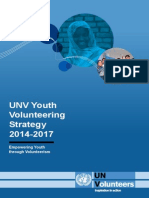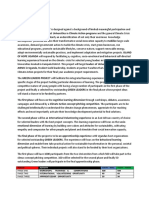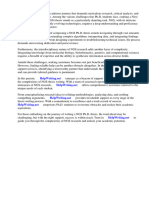Youth Climate Change
Youth Climate Change
Uploaded by
Hitman 47Copyright:
Available Formats
Youth Climate Change
Youth Climate Change
Uploaded by
Hitman 47Original Description:
Original Title
Copyright
Available Formats
Share this document
Did you find this document useful?
Is this content inappropriate?
Copyright:
Available Formats
Youth Climate Change
Youth Climate Change
Uploaded by
Hitman 47Copyright:
Available Formats
YOUTH AND
CLIMATE CHANGE
Human activities, such as the use of fossil
HIGHLIGHTS fuels, deforestation and unsustainable
agriculture contribute to climate change,
• In response to the growing number of engaged which decreases the availability of
youth organizations in the intergovernmental nutritious food and clean water, and
climate change process, in 2009, the UNFCCC destroys ecosystems and secure living
extended a constituency status to admitted environments. This leads to malnutrition,
youth NGOs allowing them to receive official ill health and migration, rendering youth
information, participate in meetings, request particularly vulnerable. At the same time,
speaking slots and receive logistical support at youth constitute the majority of the
UNFCCC conferences. population in many countries and have an
• Over 10,000 youth have already completed the increasingly strong social and
Climate Change Challenge badge developed by environmental awareness, which has the
FAO, the World Association of Girl Guides and power to transform our societies towards
Girl Scouts and the Youth and United Nations a low-carbon and climate resilient future.
Global Alliance1.
• Since 2004 over 4,500 children and young The United Nations, Youth
people participated in annual UNEP Tunza
and Climate Change
International Conferences, representing over
100 countries, and covering a number of issues
The United Nations System recognizes the
ranging from climate change to the green key role that youth play in tackling
economy and green jobs. The Tunza website climate change and works closely with
receives over 1 million visits per year. youth-led and youth-focussed
organizations around the world through
the United Nations Joint Framework Initiative on Children, Youth and Climate Change (Joint
Framework Initiative). Since 2008 the Joint Framework Initiative has been coordinating efforts by
sixteen intergovernmental entities2 and many youth organizations to empower youth to take
adaptation and mitigation actions and enhance effective participation of youth in climate change
policy decision-making processes.
1
http://www.wagggs.org/en/cop17/blogsvideos/megan
2
Convention on Biological Diversity; Food and Agricultural Organization of the United Nations; United Nations Convention
to Combat Desertification; United Nations Children's Fund; United Nations Department of Economic and Social Affairs -
Division for Sustainable Development; United Nations Development Programme; United Nations Environment Programme;
United Nations Framework Convention on Climate Change; United Nations Human Settlements Programme; Unite Nations
Institute for Training and Research; United Nations Non-governmental Liaison Service; United Nations Organizations for
Education, Science and Culture; United Nations Population Fund; United Nations Programme on Youth; United Nations
Volunteers; World Bank.
http://undesadspd.org/Youth.aspx facebook.com/UN4Youth twitter.com/UN4Youth
Youth and Climate Change
• The Food and Agricultural Organization of the United Nations (FAO) supports the
development of food security and climate change educational programmes and resources
for rural farmer field and life schools.
• The United Nations Development Programme (UNDP) implements the Global Environment
Facility’s Small Grants Programme, which provides funding for projects on mitigation or
adaptation to climate change proposed by youth organizations or non-governmental
organizations that work with youth.
• Through its Climate Change Education for Sustainable Development Programme, the United
Nations Educational, Scientific and Cultural Organization (UNESCO) supports the
development of national climate change education programmes, policies and resources.
• With the YouthXchange initiative UNESCO and United Nations Environment Programme
(UNEP) support youth projects on sustainable lifestyles in 45 countries around the world.
• UNEP adopted a long-term Tunza Youth Strategy for engaging youth in environmental
activities in the areas of capacity-building, environmental awareness and information
exchange, with a vision to foster a generation of environmentally conscious citizens, capable
of positive action.
• The United Nations Human Settlements Programme (UN-HABITAT) supports youth-led
groups through its Urban Youth Fund and ‘One Stop Youth Resource Centres’ to develop
programmes to mitigate the effects of climate change in urban areas.
• The United Nations Children’s Fund (UNICEF)’s Climate Change Adaptation and Disaster Risk
Reduction teams have greatly contributed to the introduction of Education for Sustainable
Development (ESD) for the past eight years through the Inter-Agency Committee (IAC) of the
United Nations Decade of Education for Sustainable Development (DESD 2005-2014). As
2013 IAC Chair, UNICEF is prioritizing programmes that support adolescence and girls/youth
empowerment.
• The United Nations Institute for Training and Research (UNITAR) supports, through UN
CC:Learn3, a long-term and strategic approach to climate change education which includes
designing national strategies, developing learning materials for both formal and non-formal
learning contexts, and raising international awareness of the need to integrate of climate
change fundamentals into national curriculums.
• The United Nations Framework Convention on Climate Change (UNFCCC) secretariat
coordinates the work of the Joint Framework Initiative. It also works closely with the rapidly
expanding UNFCCC observer constituency of youth non-governmental organizations
(YOUNGO) to support the substantive engagement of youth in the intergovernmental
climate change process through the organization of high-level briefings with decision-
makers, capacity-building events for youth organizations, the facilitation of youth
3
UN CC:Learn is a partnership of 33 multilateral organizations which supports Member States in designing and
implementing results-oriented and sustainable learning to address climate change. The Secretariat for UN CC:Learn is
2
provided by UNITAR.
Page
http://undesadspd.org/Youth.aspx facebook.com/UN4Youth twitter.com/UN4Youth
Youth and Climate Change
participation from developing countries and virtual participation of youth around the world
who cannot attend UNFCCC conferences.
Progress
In response to the growing number of engaged youth organizations in the intergovernmental climate
change process, in 2009, the UNFCCC extended a constituency status to admitted youth NGOs
allowing them to receive official information, participate in meetings, request speaking slots and
receive logistical support at UNFCCC conferences. In only four years YOUNGO has developed into a
vibrant network of youth activists, through which youth make their voices heard and actively
contribute to shaping the intergovernmental climate change policies. At UNFCCC conferences
YOUNGO makes official statements, provides technical and policy inputs to negotiation groups,
engages with decision-makers through high-level meetings and in informal settings and raises
awareness through various advocacy activities. Youth participation has brought moral,
intergenerational and equity-based values as well as constructive technical and policy inputs to the
negotiations.
Back in their home countries and communities, youth are taking action on climate change mitigation
and adaptation. Diverse initiatives include educational, awareness-raising and behavioural change
campaigns. Youth also engage in climate change projects within different national and international
organizations. Over 10,000 youth have already completed the Climate Change Challenge badge
developed by FAO, the World Association of Girl Guides and Girl Scouts and the Youth and United
Nations Global Alliance. Since 2004 over 4,500 children and young people participated in annual
UNEP Tunza International Conferences, representing over 100 countries, and covering a number of
issues ranging from climate change to the green economy and green jobs. The Tunza website
receives over 1 million visits per year. Between 1991 and 2012 more than 3 million entries were
received in the Tunza International Painting Competition from over 100 countries. UNEP will
continue to engage children and youth through, for example, regional conferences, the Tunza
Advisory Council and online networking. A new focus on work experience/green employment is
being developed alongside existing initiatives incorporating formal and non-formal education, and
campaigning on issues ranging from food waste to climate change.
The way forward
The work undertaken with and by youth is crucial to raise ambition of governments to come to an
agreement on a new climate change regime by 2015. Tackling climate change requires concerted
coordinated government action as well as conscious and informed efforts by individuals. Therefore,
it is essential to strengthen both formal and informal education on climate change and viable
lifestyles. In addition, sustainable production and consumption patterns must be promoted and
youth supported as environmental champions in their local communities. Partnerships should be
developed between governments, intergovernmental, non-governmental and youth organizations
for joint environmental initiatives aimed at building the capacity of youth as future leaders and
driving forces behind a new climate change regime. Considerable efforts are also needed in
strengthening the adaptive capability and resilience of youth in rural communities in developing
countries.
3
Page
http://undesadspd.org/Youth.aspx facebook.com/UN4Youth twitter.com/UN4Youth
Youth and Climate Change
More efforts must be made to ensure that youth are ready to take advantage of new environment-
oriented employment opportunities. Growing attention to climate change and sustainable
development offers a chance for green economic growth around the world. Green jobs not only
provide much-needed employment opportunities for youth, they also give youth an outlet to
contribute directly to the fight against climate change by adopting green behaviors in the workplace
as well as in their private lives.
For further information
• http://www.fao.org/climatechange/youth
• http://yunga-youth.weebly.com/
• UNICEF and Climate Change and Environmental Education:
http://www.unicef.org/education/bege_61668.html
• www.undp.org/sgp
• Climate Change Education for Sustainable Development at UNESCO:
http://www.unesco.org/new/en/education/themes/leading-the-international-
agenda/education-for-sustainable-development/climate-change-education/
• YouthXchange Climate Change and Lifestyles Guidebook:
http://unesdoc.unesco.org/images/0021/002128/212876E.pdf
• YouthXChange Training Kit on Responsible Consumption:
http://unesdoc.unesco.org/images/0015/001587/158700e.pdf
• TUNZA http://www.unep.org/tunza
• UNFCCC Youth Portal: http://unfccc.int/cc_inet/cc_inet/youth_portal/items/6578.php
• UN Joint Framework Initiative on Children, Youth and Climate Change:
http://unfccc.int/cc_inet/cc_inet/youth_portal/items/6519.php
• Growing Together in a Changing Climate, the United Nations, Young People, and Climate
Change
http://unfccc.int/files/cc_inet/information_pool/application/pdf/growingtogether.pdf
• Youth Participation in the UNFCCC Negotiation Process: The United Nations, Young People
and Climate Change
http://unfccc.int/files/cc_inet/information_pool/application/pdf/unfccc_youthparticipation.
• Youth in Action on Climate Change: Inspirations from Around the World:
http://unfccc.int/cc_inet/cc_inet/information_pool/simple_search/items/3522.php?display
Pool=1584&lang=6
• http://uniteforclimate.org/
This fact sheet was prepared by the United Nations Joint Framework Initiative on Children, Youth and Climate Change.
It is part of a collaborative effort of the United Nations Inter-Agency Network on Youth Development to provide an
overview on how the United Nations system works with young people on different issues.
4
Page
http://undesadspd.org/Youth.aspx facebook.com/UN4Youth twitter.com/UN4Youth
You might also like
- Rock Physics & SeismicDocument64 pagesRock Physics & Seismicmelannie adanteNo ratings yet
- Youth Xchange Climate Change and Lifestyles GuidebookDocument64 pagesYouth Xchange Climate Change and Lifestyles GuidebookUnited Nations Environment ProgrammeNo ratings yet
- 4 Sustainable Development Goals Virtual Youth Summer Camp Syllabus and Participant GuideDocument2 pages4 Sustainable Development Goals Virtual Youth Summer Camp Syllabus and Participant GuideJulan CastroNo ratings yet
- Coll. - Not Just Hot Air _ Putting Climate Change Education Into Practice-UNESCODocument88 pagesColl. - Not Just Hot Air _ Putting Climate Change Education Into Practice-UNESCOHisa HunterNo ratings yet
- International Year of YouthDocument20 pagesInternational Year of YouthAdilaNo ratings yet
- Transforming Our World: Transitioning From The Millennium Development Goals To The Sustainable Development Goals (Agenda 2030)Document8 pagesTransforming Our World: Transitioning From The Millennium Development Goals To The Sustainable Development Goals (Agenda 2030)Michael John JamoraNo ratings yet
- End of Year Report 2010Document17 pagesEnd of Year Report 2010Ebrima S. DemNo ratings yet
- UNEPDocument2 pagesUNEPTú VũNo ratings yet
- UNICEFHRBArev 1Document14 pagesUNICEFHRBArev 1Barnabás SzalmásiNo ratings yet
- Children and YouthDocument3 pagesChildren and YouthchadlowNo ratings yet
- Teaching Climate Change Using Project Based LearningDocument47 pagesTeaching Climate Change Using Project Based Learningkumartuntun3061No ratings yet
- UNEP BG Green FinanceDocument18 pagesUNEP BG Green Financeaashank13singhNo ratings yet
- What Role Does The Youth of The Commonwealth Need To Play in Progress Toward Low-Carbon Economies?Document3 pagesWhat Role Does The Youth of The Commonwealth Need To Play in Progress Toward Low-Carbon Economies?Diaspora Youth EmpowermentNo ratings yet
- East Asia and Pacific UNV Newsletter, Issue No 2Document16 pagesEast Asia and Pacific UNV Newsletter, Issue No 2UNVCambodiaNo ratings yet
- UNEP Your Partner For People and Planet Part1Document9 pagesUNEP Your Partner For People and Planet Part1Anh KimNo ratings yet
- UNESCO at A GlanceDocument40 pagesUNESCO at A GlancecarcademiaNo ratings yet
- Share Arslan Yaris (M-WPS OfficeDocument10 pagesShare Arslan Yaris (M-WPS OfficeArslan YarisNo ratings yet
- United Nations Educational, Scientific and Cultural OrganizationDocument8 pagesUnited Nations Educational, Scientific and Cultural OrganizationRicardo de AragãoNo ratings yet
- Science, Technology & Society Module 4Document8 pagesScience, Technology & Society Module 4Earl Daniel PulpulaanNo ratings yet
- The GLOBALIZATION OF WORLD REGIONDocument13 pagesThe GLOBALIZATION OF WORLD REGIONKristine San Luis PotencianoNo ratings yet
- UNEP Your Partner For People and PlanetDocument44 pagesUNEP Your Partner For People and PlanetdigitalexplorerbyiscNo ratings yet
- A Pragmatic Environmental Education For Reawakening Environmental ConsciousnessDocument5 pagesA Pragmatic Environmental Education For Reawakening Environmental Consciousnessipgm-2015No ratings yet
- A Green Economy in A Blue WorldDocument24 pagesA Green Economy in A Blue WorldUNDP_Environment100% (1)
- Information Resources On Environmental Studies - An OverviewDocument11 pagesInformation Resources On Environmental Studies - An OverviewVenugopal ReddyvariNo ratings yet
- Public Health Nutrition: Submitted By: Ishita Gupta ROLL NO: 1025/21 Post Graduate Diploma Nutrition and DieteticsDocument14 pagesPublic Health Nutrition: Submitted By: Ishita Gupta ROLL NO: 1025/21 Post Graduate Diploma Nutrition and DieteticsBarbie mendroliaNo ratings yet
- Unit 5Document12 pagesUnit 5mystictiara004No ratings yet
- Benkenstein Introduction 2020Document9 pagesBenkenstein Introduction 2020fatimaasif2810No ratings yet
- United Nations Development ProgramDocument21 pagesUnited Nations Development ProgramIshitaNo ratings yet
- Final East African SusWatch E Bulletin April 2021Document3 pagesFinal East African SusWatch E Bulletin April 2021Kimbowa RichardNo ratings yet
- Green Economy Blue FullDocument132 pagesGreen Economy Blue FullAkram ShhaidehNo ratings yet
- INTO Members and The SDGsDocument29 pagesINTO Members and The SDGsromi designNo ratings yet
- Cbd-Good-Practice-Guide-Forestry-Booklet-Web-En 41Document1 pageCbd-Good-Practice-Guide-Forestry-Booklet-Web-En 41teediewjaNo ratings yet
- Women and The EnvironmentDocument17 pagesWomen and The EnvironmentPrabina JoshiNo ratings yet
- Reading PracticeDocument4 pagesReading Practicestephania veraciertaNo ratings yet
- Greening Curriculum Guidance - Teaching and Learning For Climate ActionDocument179 pagesGreening Curriculum Guidance - Teaching and Learning For Climate ActionBruceNo ratings yet
- Sustainable DevelopmentDocument7 pagesSustainable DevelopmentPriyanshu RanjanNo ratings yet
- Environmental Public Education and AwarenessDocument13 pagesEnvironmental Public Education and AwarenessshahidNo ratings yet
- UNV Youth Volunteering Strategy 2014-2017, Empowering Youth Through VolunteerismDocument13 pagesUNV Youth Volunteering Strategy 2014-2017, Empowering Youth Through VolunteerismUnited Nations VolunteersNo ratings yet
- Bem4101 Introduction To Environmental Education Lesson Eleven-1Document16 pagesBem4101 Introduction To Environmental Education Lesson Eleven-1joan.linda69No ratings yet
- FileDocument2 pagesFileheyzaringoNo ratings yet
- 5 Environmental Awareness and Prevention SY 21 22.pubDocument12 pages5 Environmental Awareness and Prevention SY 21 22.pubIvan Dwight Lagura BautistaNo ratings yet
- EEG-Emirates Environmental GroupDocument2 pagesEEG-Emirates Environmental GroupjemijemidxbNo ratings yet
- UNDP WS IslandInnovations UNDP GEF Leveraging The Env PDFDocument60 pagesUNDP WS IslandInnovations UNDP GEF Leveraging The Env PDFMznalqadiNo ratings yet
- Environmental Law Institutions IDocument6 pagesEnvironmental Law Institutions IObafemi AdeoyeNo ratings yet
- mjeeducation,+MJE Vol 012 Num 002 1977 Fall GillettDocument3 pagesmjeeducation,+MJE Vol 012 Num 002 1977 Fall GillettquraysharNo ratings yet
- Climate Action Team Launch FinalDocument2 pagesClimate Action Team Launch FinalJan DashNo ratings yet
- How To Start An ECO ClubDocument28 pagesHow To Start An ECO Clubanurag sahayNo ratings yet
- 18-19 Module 4 PDFDocument14 pages18-19 Module 4 PDFrow rowNo ratings yet
- Civic Entrepreneurship-VOLUME4Document388 pagesCivic Entrepreneurship-VOLUME4Tariq Banuri100% (1)
- Climate Risk Management in Africa: Learning From PracticeDocument116 pagesClimate Risk Management in Africa: Learning From Practiceapi-25962061No ratings yet
- National Environment and Climate Change Communication Strategy 2012-2016Document58 pagesNational Environment and Climate Change Communication Strategy 2012-2016Muhammad AnnafiNo ratings yet
- Unesco and The Tbilis Declaration Fundira-2012Document6 pagesUnesco and The Tbilis Declaration Fundira-2012Janvw FundiraNo ratings yet
- Press Release: Lack of Toilets Dangerous For Everyone, UNICEF SaysDocument2 pagesPress Release: Lack of Toilets Dangerous For Everyone, UNICEF Saysapi-212683965No ratings yet
- Green Leaders Project Propodal - Second DraftDocument14 pagesGreen Leaders Project Propodal - Second Draftainebyoona robertNo ratings yet
- 5 +unepDocument9 pages5 +unepharshitNo ratings yet
- Eight Millennium Development Goals (MDGS)Document51 pagesEight Millennium Development Goals (MDGS)Saba Parvin HaqueNo ratings yet
- Climate Change and Lifestyles: Youthxchange Guidebook SeriesDocument4 pagesClimate Change and Lifestyles: Youthxchange Guidebook SeriesaboutammamhabibNo ratings yet
- HungerDocument23 pagesHungerdhurgeshmalothNo ratings yet
- Education for Sustainable Development in the Caribbean: Pedagogy, Processes and PracticesFrom EverandEducation for Sustainable Development in the Caribbean: Pedagogy, Processes and PracticesNo ratings yet
- One Billion Hungry: Can We Feed the World?From EverandOne Billion Hungry: Can We Feed the World?Rating: 3.5 out of 5 stars3.5/5 (4)
- Protecting the Future: Stories of Sustainability from RMIT UniversityFrom EverandProtecting the Future: Stories of Sustainability from RMIT UniversitySarah S. HoldsworthNo ratings yet
- DatasheetDocument2 pagesDatasheetJuliaaplicNo ratings yet
- FINAL-DEMO-DLP-Subtraction-with-Regrouping 2Document20 pagesFINAL-DEMO-DLP-Subtraction-with-Regrouping 2Karen Perez CalaguasNo ratings yet
- Further Maths js2 20245 AlphaDocument56 pagesFurther Maths js2 20245 AlphaFagbolade AyomideNo ratings yet
- RESUME enDocument2 pagesRESUME enbulandavinaderyNo ratings yet
- Sturm-Liouville TheoryDocument12 pagesSturm-Liouville TheorywaveletNo ratings yet
- ASS 4.1 - Module 4Document2 pagesASS 4.1 - Module 4Yurika PalmonesNo ratings yet
- Module 16 - UNIT IV - Chemistry of The AtmosphereDocument10 pagesModule 16 - UNIT IV - Chemistry of The AtmosphereJhess GaliciaNo ratings yet
- Indian Society (SC Dubey)Document151 pagesIndian Society (SC Dubey)Deepak GBNo ratings yet
- Perlifoc HP ECO BrochureDocument60 pagesPerlifoc HP ECO Brochureroslin.arif.pfpNo ratings yet
- Crack Arrest Toughness Estimation For High Strength Steels From Sub-Sized Charpy-V TestsDocument1 pageCrack Arrest Toughness Estimation For High Strength Steels From Sub-Sized Charpy-V TestsOtso CronvallNo ratings yet
- Samantha Yannuzzi - Coaching PhilosophyDocument2 pagesSamantha Yannuzzi - Coaching Philosophyapi-500152310No ratings yet
- Choices of PrudenceDocument39 pagesChoices of PrudencePaul DrakeNo ratings yet
- Determination of The Amine Value: Mettler Toledo Application M242Document4 pagesDetermination of The Amine Value: Mettler Toledo Application M242Hasan Zeki BayrakNo ratings yet
- Geometry: Review Exercise QuestionsDocument10 pagesGeometry: Review Exercise QuestionsMustafa AhmedNo ratings yet
- Desta TegegneDocument100 pagesDesta TegegneabadiNo ratings yet
- SCIE-1002: Science and The Environment Assignment #1 (Lectures 1-4)Document4 pagesSCIE-1002: Science and The Environment Assignment #1 (Lectures 1-4)ayisha sufainaNo ratings yet
- 17 Evaluation of Improper IntegralsDocument74 pages17 Evaluation of Improper Integralsalienxx0% (1)
- Produc Specification IRB 2600Document78 pagesProduc Specification IRB 2600IonutNo ratings yet
- Photovoltaics-Report - Fraunhofer 2020Document48 pagesPhotovoltaics-Report - Fraunhofer 2020Maria Agostina MaineriNo ratings yet
- Plan of Land: Marcelino S. Obien Jr. Et AlDocument1 pagePlan of Land: Marcelino S. Obien Jr. Et AlJulia Marie CondolonNo ratings yet
- The Benefits of 3R For Our EnvironmentDocument2 pagesThe Benefits of 3R For Our EnvironmentRohmatullah RohmatullahNo ratings yet
- A Soil ProfileDocument4 pagesA Soil ProfileValNo ratings yet
- Lesson 1: Learning ObjectivesDocument23 pagesLesson 1: Learning ObjectivesGRACE WENDIE JOY GRIÑONo ratings yet
- Next Generation Sequencing PHD ThesisDocument8 pagesNext Generation Sequencing PHD ThesisSomeoneWriteMyPaperForMeSingapore100% (2)
- TCWD Lecture 1Document40 pagesTCWD Lecture 1Angelyn Grace TanNo ratings yet
- Lie Detection TechniquesDocument11 pagesLie Detection TechniquesRamil Jay IganaNo ratings yet
- Resume Nursyamimi BT Mohd ZinDocument1 pageResume Nursyamimi BT Mohd ZinCik NurNo ratings yet
- Proposal For A Curriculum Reform - 2022Document18 pagesProposal For A Curriculum Reform - 2022Le Di ChangNo ratings yet
- PHIPPS - & - OZANNE - 2017 - Routines Disrupted - Reestablishing Security Through Practice AlignmentDocument20 pagesPHIPPS - & - OZANNE - 2017 - Routines Disrupted - Reestablishing Security Through Practice AlignmentEstudanteSaxNo ratings yet

























































































